There is no poetic work, no matter how refined and complex it may be, capable of standing up to non-representational painting. Since the latter contains within itself all meaning to the point of imposing it even before the subject, which it doesn’t possess at all, is sought.
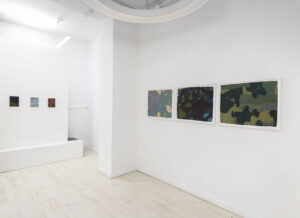
Sue Kennington, CLEARING, Curva Pura, Rome, ph. Credit Giorgio Benni, courtesy Curva Pura, Roma
It is precisely in this feigned adherence to the motif, which resides in the ability to abstract reality, that a series of questions about color, form, spontaneity of gesture, and the vividness of tone become the protagonists. In line with this thought is the exhibition by Sue Kennington (London, 1955), titled CLEARING, curated by Davide Silvioli and scheduled at Curva Pura in Rome from October 5 to November 6, 2023. Therefore, there is no doubt that the artist’s research revolves around the aforementioned logic, always filled with doubts, to the point of wandering in a state of clear and necessary conscious uncertainty, which, however, she is not concerned about but rather, on the contrary, vividly strengthened by it. Consequently, the resulting painting presents itself as a vital action based on applying colors, displayed like shavings from the soft edges that create a unique visual sensation, restoring balanced relationships, born from instinct and swift impulses.
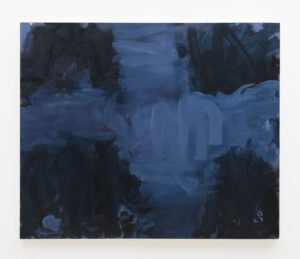
Sue Kennington, Night Flight, 2023, oil on linen, 100 x 120 cm, ph. credit Giorgio Benni, courtesy Curva Pura, Roma
From this state of indeterminacy, which should be understood not as a state of insecurity but rather as an essential and preparatory phase for the success of the work and a stimulus to its exploration, the artist is certain of one thing: she could never paint with the certainty of having everything clear in her mind, knowing in advance what will emerge from the finished work. With these premises, CLEARING generates an exhibition path with a lively rhythm, which stumbles upon the dominance of coloristic forms, allowing the works to reveal themselves as instinctive beliefs in the tip of color and brush. Indeed, the artist elucidates nebulous tonalities that dissolve and consolidate alternately, skillfully managing to capture both the moment immediately before total dissolution and the one just after creation.
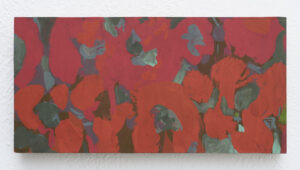
Sue Kennington, Flammable system, gouache on HP paper mounted on panel, 15 x 30 cm, ph. credit Giorgio Benni, courtesy Curva Pura, Roma
In this rhapsodic analysis, Kennington is a silent accomplice to her perpetual state of inquiry because beneath the vivid forest of hues that characterize the works on display, there truly pulses an intense study activity aimed at successfully sampling a multitude of colors. It is essential to note how much it benefits the artist to describe the world through her own eyes as a color experimenter, so she never observes creation neutrally and from a distance but studies it so thoroughly that she can express the energy of improvisation and at the same time make its heaviness soar and weigh the tonal gravities. Even her beloved studio in the Tuscany countryside is filtered through natural flashes, becoming the place of excellence where every color is found in a cathedral that protects and regenerates.
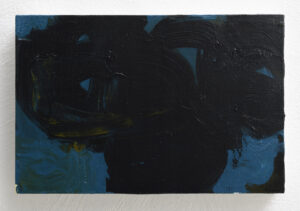
Sue Kennington, Artemis, 2020, oil on linen, 25 x 38 cm, ph. credit Giorgio Benni, courtesy Curva Pura, Roma
In this interpretive perspective, Kennington’s painting must be commented on in terms of light, revealing itself as boldly delicate and refined, capable of translating the harmony of the mathematical canon of the ordinary colors found in creation. However, the artist consciously distances herself from this goal, as she senses that she does not want to intentionally make these shades resemble those found in nature. Instead, she creates unknown and evocative breaths of life in which tone can convey immediate vibrations. All the exhibited works stand as zenithal windows that open a projection towards a changing geography of flashes: an opening to a real but at the same time imaginary forest, where the aim is always a firm and confirmed relationship between form, color, and resonance. And even though her attitude is like that of a scientist intending to illustrate already-revealed truths, Kennington behaves unpredictably. Thus, the only restraint she knows against the excesses of repetition and rigid control on the canvas is improvisation, relying on the inspiration of tonalities she believes she does not know. This choice holds vital importance, as it does not impose forced aesthetic alternatives but acts only where the hand’s impulse slides towards improbable colorations and forms. Therefore, what she creates is always challenging to recite and repeat.
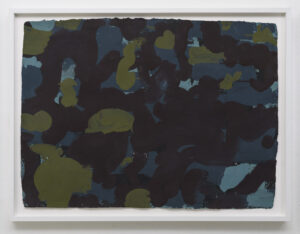
Sue Kennington, Gamma 2, 2023, tempera on heavy khadi paper, 57 x 76 cm, ph. credit Giorgio Benni, courtesy Curva Pura, Roma
This spontaneity allows the artist to behave as if executing a graphic writing with brushstrokes filled with the colors of spring and autumn, where every painterly action is carefully regulated by a blink of an eye, which, if absent, could throw all the work’s balance into disarming chaos. However, anyone is free to read in what is displayed a multitude of bustling things both above and below the surfaces, leaving room to perceive the tremor of the brushstroke as a moment of glorious liberation that defuses an act in which the beloved colors are incinerated and then dispersed on the painting surfaces. Therefore, among the works on display, the artist’s gouache on wood panels are of the greatest interest and rarity, convinced as one must be that the act of painting comes after that of thinking and observing, the latter moments giving a clear sense to the soft forms that settle into a morphogenetic character.

Sue Kennington, CLEARING, Curva Pura, Rome, ph. Credit Giorgio Benni, courtesy Curva Pura, Roma
So the artist is vigorously drawn to both brightness, intended as a large environmental diorama, and darkness, which resonates with the allure in all the implicit expectations in the enchantment and grace that tones can offer in these temporal moments. Therefore, we shouldn’t be surprised that there is an unexpectedly vivid yellow canvas on display, the result of a nocturnal exploration in which broad, enticingly frayed brushstrokes rapidly disrupt the balance. Yet, even in this case, everything falls into place, thanks to Kennington’s indomitable ability to be gentle and uncertain in managing color dynamics. In this purified appreciation for the breaking of strokes like scythes, chimeric echoes between form and substance come true, avoiding the trap of a fixed motif or style. All of this, in the end, happens to decode the value of creative instinct, as knowledge of a related form of one or more colors, a fanciful becoming, in other words, where clarity and, especially, stagnating darkness seem to wonderfully transform into scenic intervals, producing rapid, painterly embraces of uncertain certainty.
Maria Vittoria Pinotti
Info:
Sue Kennington, Clearing
curated by Davide Silvioli
5/10/2023 – 6/11/2023
Hours: Tuesday and Thursday from 6.30pm or by appointment
for reservations: curvapura@gmail.com | whatsapp 3314243004
Curva Pura, via G. Acerbi 1, Roma
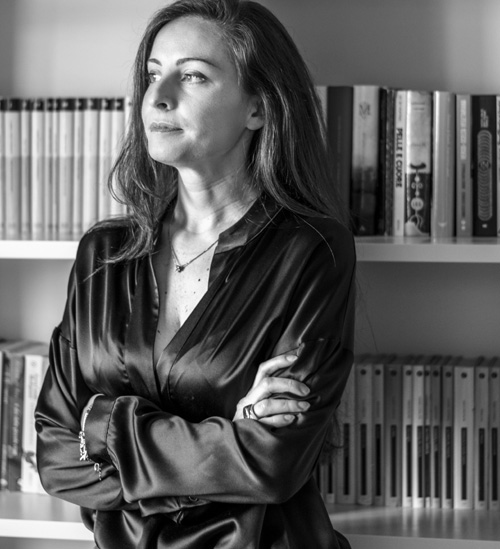
Maria Vittoria Pinotti (1986, San Benedetto del Tronto) is an art historian, author, and independent critic. She currently is the coordinator of Claudio Abate’s photographic archive and Manager at Elena Bellantoni’s Studio. From 2016 to 2023 she was the Gallery Manager in a gallery in the historic center of Rome. She has worked with ministerial offices such as the General Secretariat of the Ministry of Culture and the Central State Archive. Currently, she collaborates with cultural sector magazines, focusing on in-depth thematic studies dedicated to modern and contemporary art.






NO COMMENT